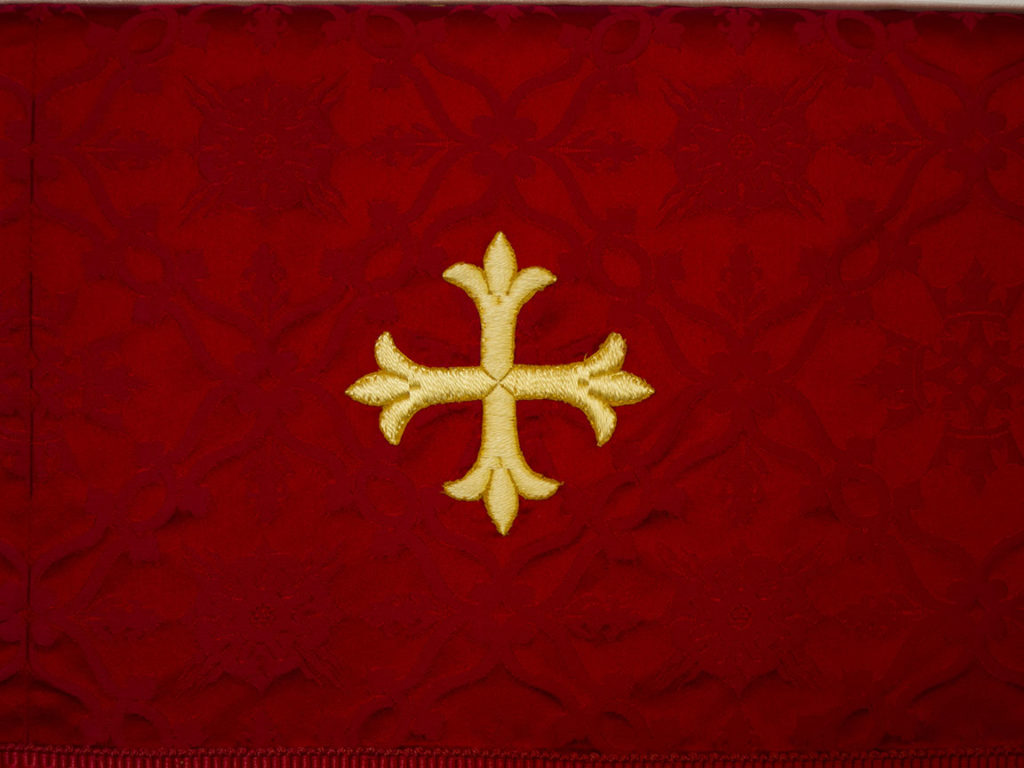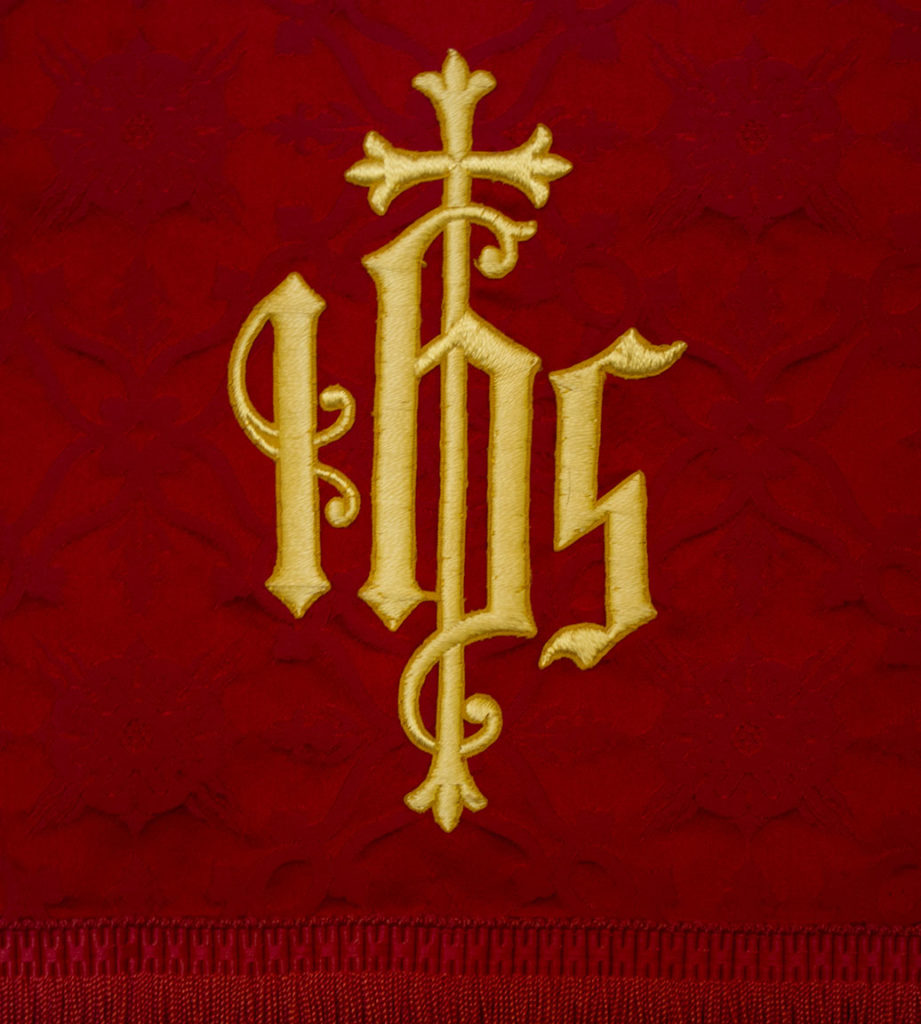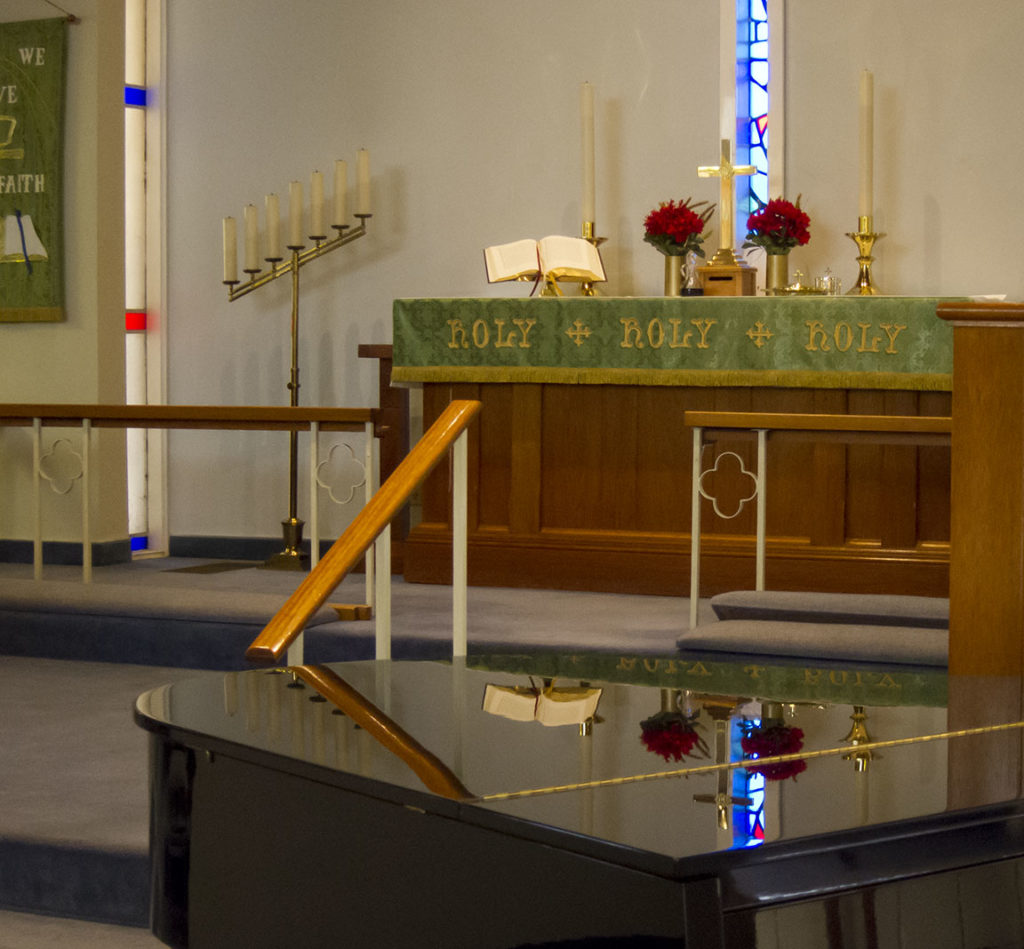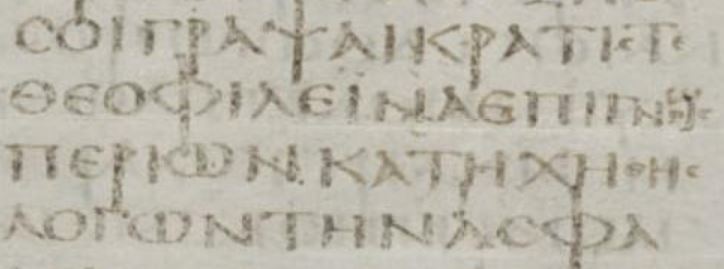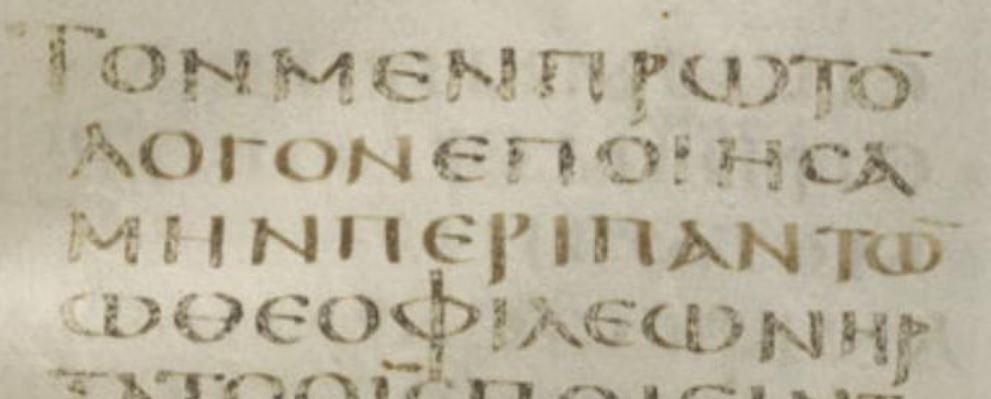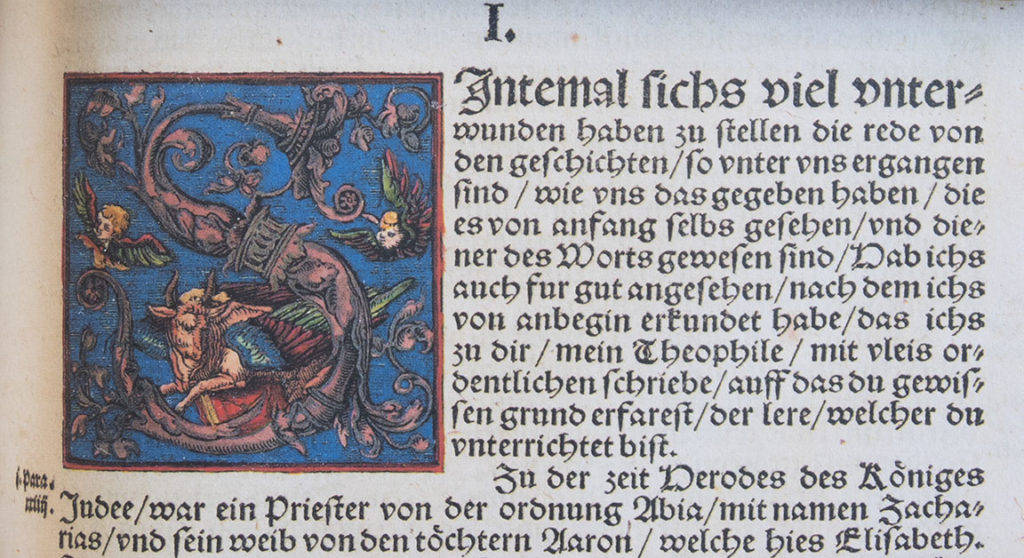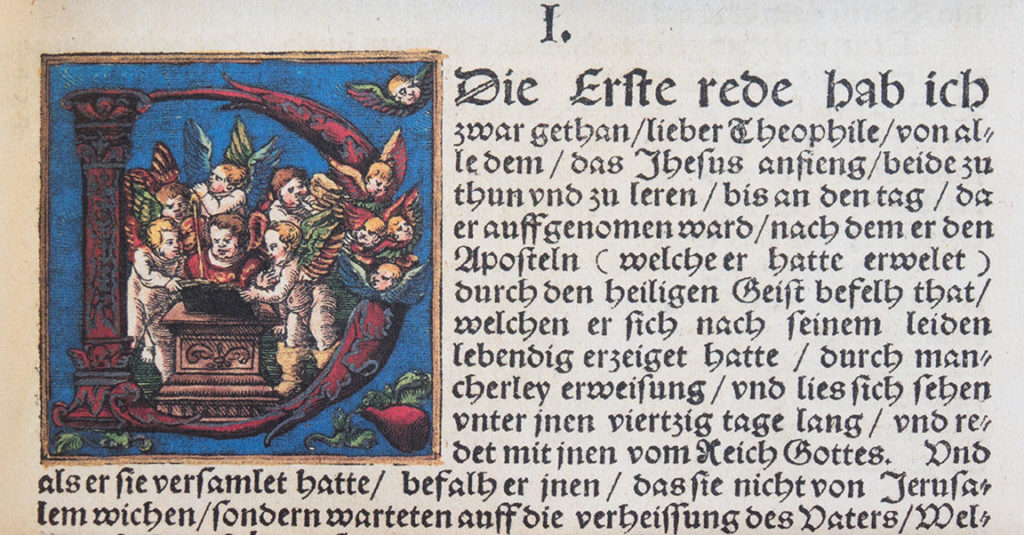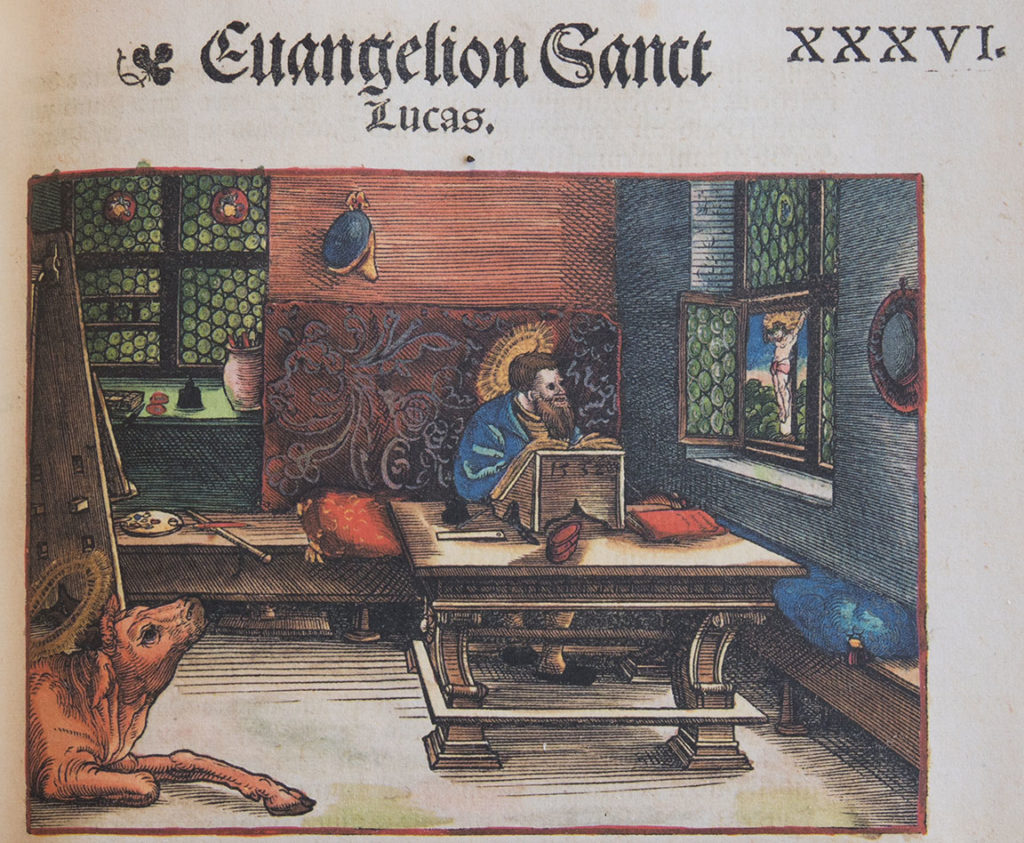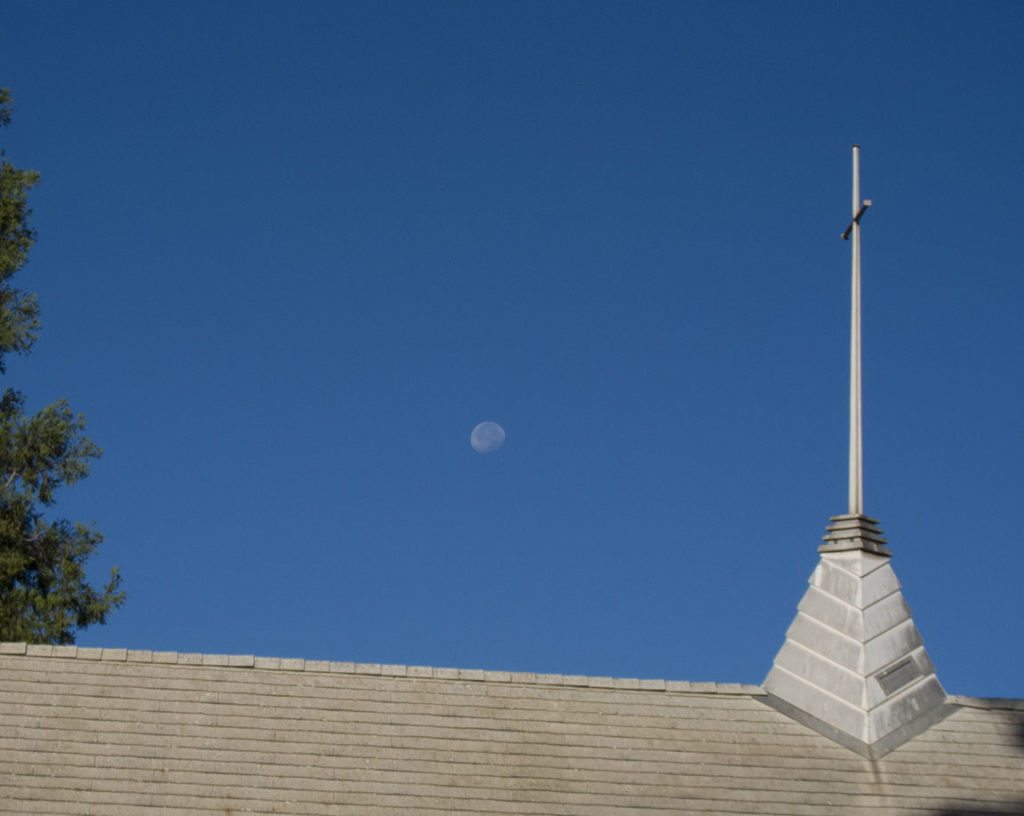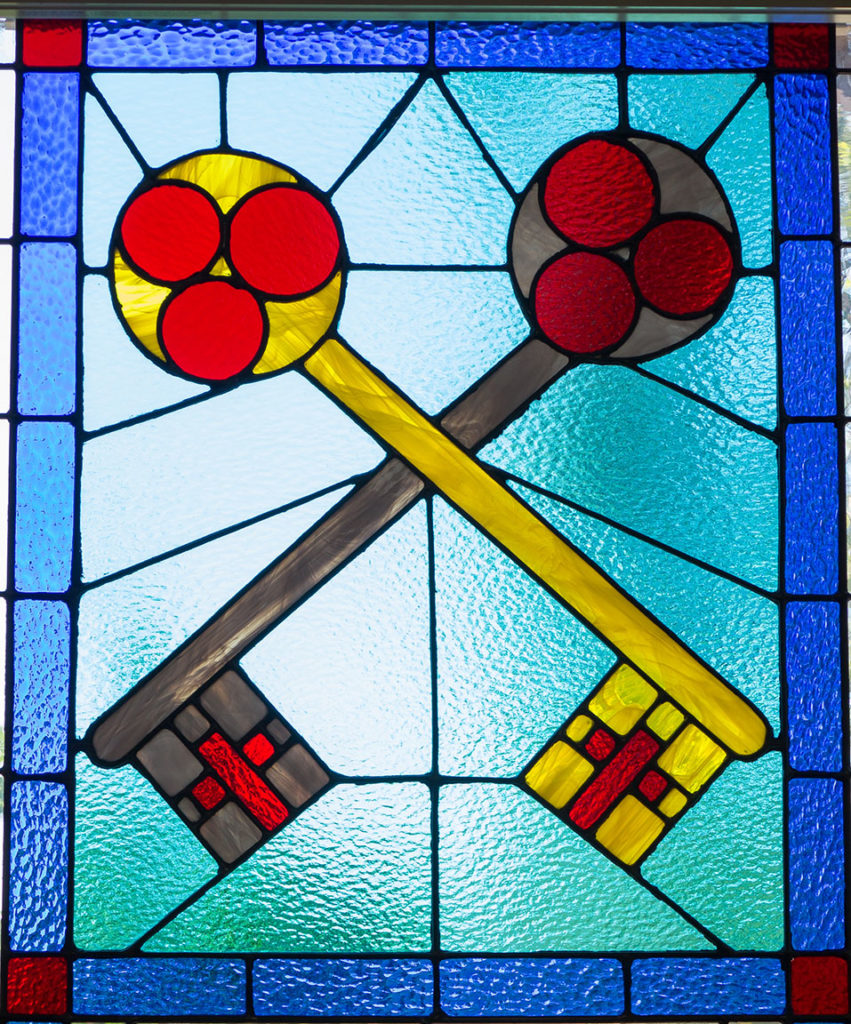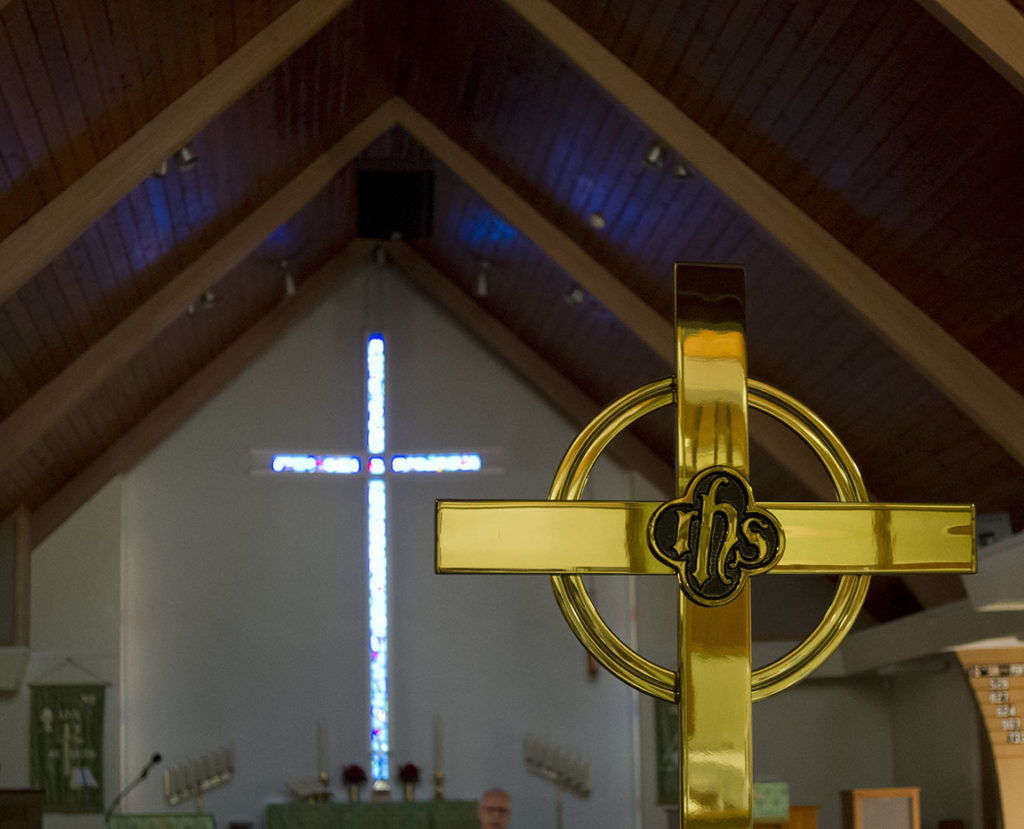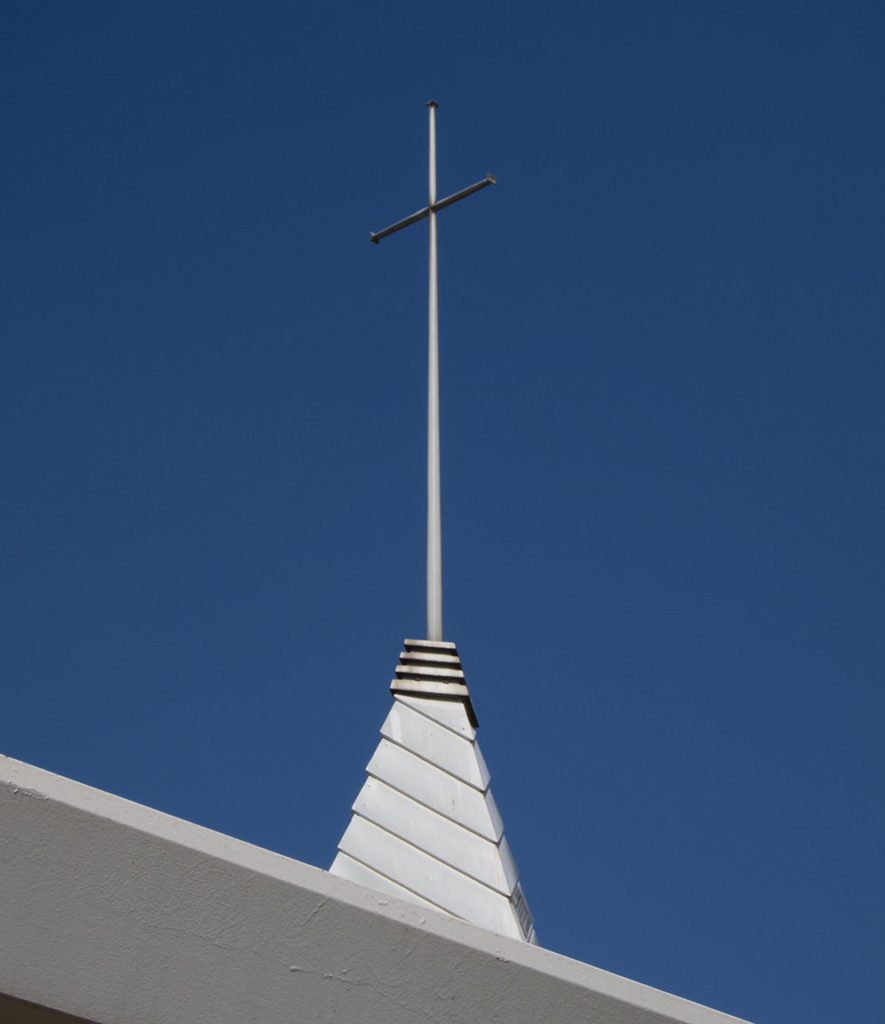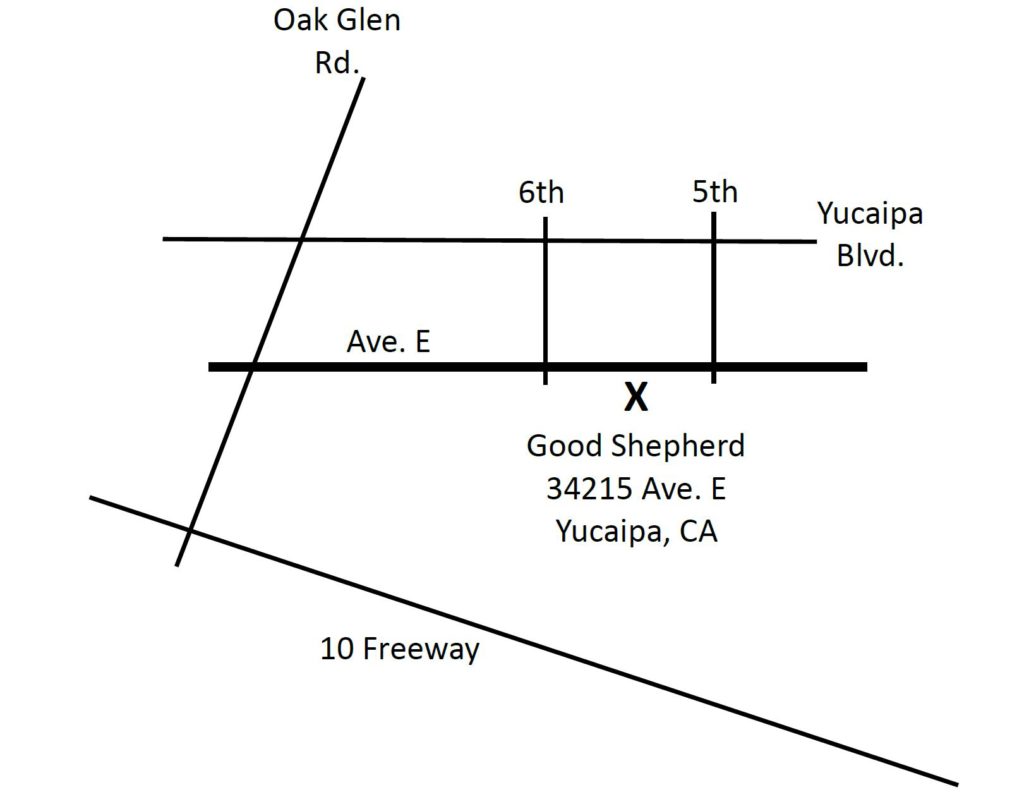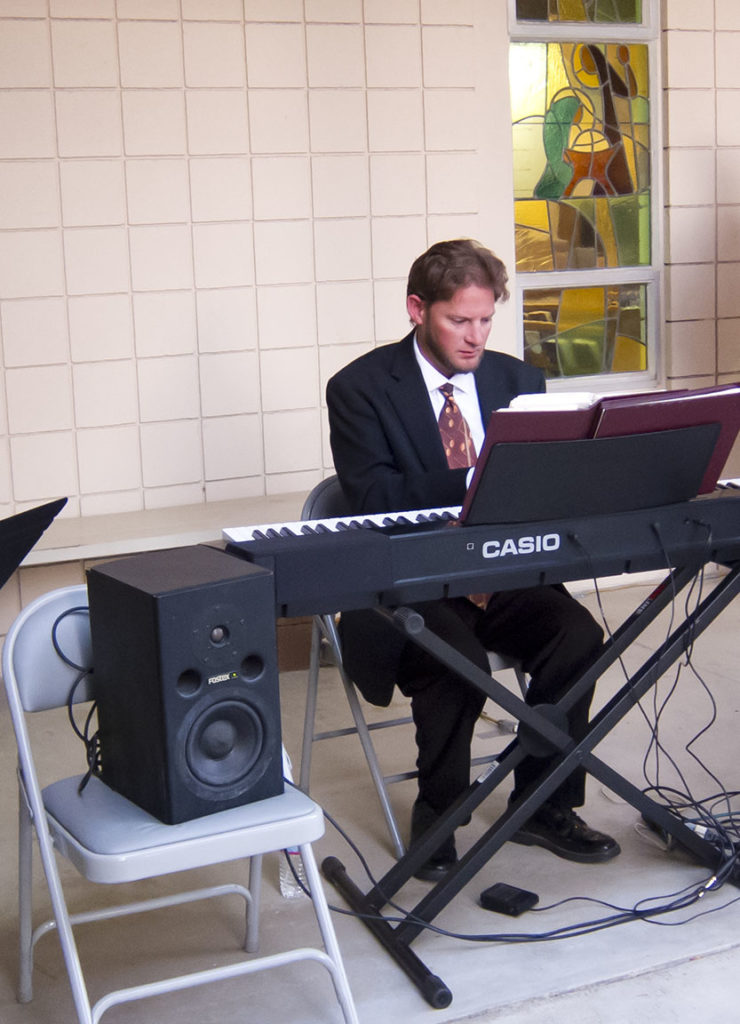Rev’d Mark B. Stirdivant, Good Shepherd Lutheran Church, Yucaipa, California
✝ sdg ✝
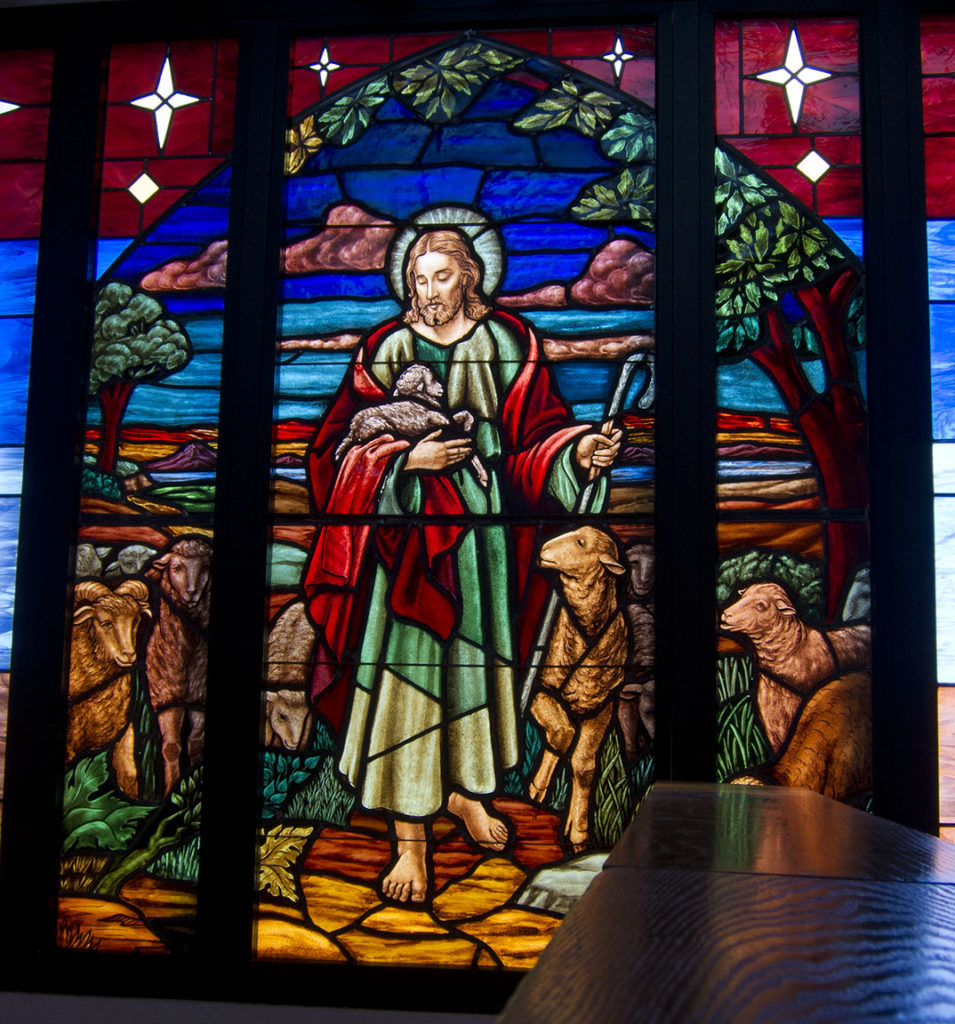
Good Shepherd window, Grace Lutheran, Rialto
This sermon is from Pastor Eric Kaelberer of Grace Lutheran in Rialto, who graciously stepped in when I could not make it to church. Then following below is the sermon I had prepared for the 22nd, but did not preach. God’s blessings and thanks so much for your prayers! Pastor and Krika and Turner, whom, God willing, will be baptized on November 12th.
Beloved of the Lord, Happy Birthday! I guess we’ll hear that again next Sunday as we celebrate the Reformation. But as you did a few years ago when Kelly Nava gave birth to Zoe, every time a pastor’s wife gives birth, the baby holds a special place in the hearts of the congregation. My own bride, my Kawai is sitting in the pew with me this morning, rejoicing with all of you, anticipating with all of you, praying with all of you that Krika, your beloved Pastor’s dear bride will be safe and that their dear son will be safely delivered and be healthy.
I’ll let you in on a little secret: Every time there is a birth in the church, the pastor and his wife rejoice, for that child of yours becomes theirs as well. I guess that is the true meaning that we are brothers and sisters in Christ! What a miracle, what a blessing. You belong to me, and I to you. We weep with those who weep and we rejoice with those who rejoice. Yes, today my wife and I celebrate with you and with Krika and your dear pastor as we sing and celebrate the birth of this fine little boy… we say it as we commend ourselves and this dear family into His care… Happy Birthday Good Shepherd, Happy Birthday!
That brings us to our texts. Did you catch the Introit? It is from that blessed 121st Psalm:
The Lord is your | keeper;*
the Lord is your shade on your | right hand.
I lift up my eyes | to the hills.*
From where does my | help come?
My help comes | from the Lord,*
who made | heaven and earth.
He will not let your | foot be moved;*
He who keeps you will not | slumber.
Behold, He who keeps | Israel*
will neither slum- | ber nor sleep.
The Lord will keep you from all | evil;*
He will | keep your life.
The Lord will keep your going out and your | coming in*
from this time forth and for- | evermore.
Glory be to the Father and | to the Son*
and to the Holy | Spirit;
as it was in the be- | ginning,*
is now, and will be forever. | Amen
The Lord is your | keeper;*
the Lord is your shade on your | right hand
It is one of those great Psalms of Ascents, the songs that pilgrims sang as they turned the corner and got their first real look at the City on the Hill, to Jerusalem. They knew that Salvation came from those hills. What they may not have realized when the Psalm was first sung is that on the hills just outside the gates of the city, the hill called Golgotha, that He who watches over Israel, the never slumbering, never sleeping one, the One who keeps you from all evil, that is, who forgives all sins, that is ALL sins, the one who keeps your life… for eternity…
He went to Golgotha to pay the full price for your redemption.
He has you. He has Krika and that beautiful baby. Going out and coming in. That is the movement. Did you catch it, beloved, the first motion is the going out, then the coming back in. For the pilgrims coming to Jerusalem for the first time this was particularly important. Though they may never have seen the Temple, with all its gold and fine linen, its woven wool and acacia wood, they knew they were already in the Ark of the Church, they were already in the womb, if you will, of God’s grace. He is our Good Shepherd who keeps us safely in the sheep pen, where He causes us to be found in Him. It is all His doing and it is glorious – thus we can say, “Soli Deo Gloria!”
This Good Shepherd is keeping this Good Shepherd Lutheran Church – He is keeping you, as surely as He is keeping Pastor and Krika, and their dear gift from God, their new son. Thus, the pilgrim coming to Jerusalem, seeing it for the first time from afar already knows that He is safely in the ark of the Church, that Heaven is his home, all because God the Redeemer was to make their Cross His home. We are home. Today we are “in” already. Thus, shortly, after we finish our Fine Meal of the Supper of the Lord, after we finish the coffee and cookies and the Bible Class, we will “GO OUT.” We are home and we will go out. Then, next Sunday, we will “come in” again – we will return home.
But wait! There’s more. He never leaves us, never forsakes us (Hebrews 13:5), He has inscribed us on the palms of His hands (Isaiah 49:16), we are His, for surely He has called us by name! (Isaiah 43:1) He holds us close, as close as a nursing mother and even closer than that! Wherever we find ourselves, He is there, ready to forgive, to heal, to enlighten, to lead, to keep you, ye, from the scorching heat of the day, and yes, the dark cold of the night! He keeps your going out and your coming in from this time and even forevermore.
As the new Stirdivant baby comes out, he will be kept. As He is home here for his baptism, He will know that the Lord has him, from that time forth and even forevermore. Oh, how strong are the promises of our God, How strong is His Cross to save, how strong is our Good Shepherd, who reminds us that we shall never want.
Oh, Pastor and Krika’s son is a sinner, saved by Grace, even as we all are. He will know the depth of his sin and weep over it. He will know the sweetness you all know as you kneel here to receive the pronouncement of God’s grace for you, literally in your mouth as you receive Christ, the full payment for all your sins, as you eat His true body and drink of His true blood, all for your forgiveness, healing and peace. To know what it means to be His own… what a gift… what a God!
Now I would be remiss if I didn’t at least touch on the Gospel. It is Holy Week, Jesus is just hours away from what is surely your cross and mine, the full payment for all sin, for all time! The Pharisees want to entrap Him, to ensnare Him in His own words, and so, like master politicians they set the trap regarding taxes and Caesar.
But unlike a politician, He answers not with the answer that will garner the most votes, as with the Tennessee politician at the time just before Prohibition (tell the story) .. He does not obfuscate, like, or deceive to curry momentary favor. He will leave that to the devil, the world, and our sinful flesh. No, He will answer their question with His gift of life and death on the Cross. He will render unto Caesar the things that are Caesar’s – in a word, full payment of the tax for living, and He will render God the full payment, the tax to cover death.
Jesus came into this world because of the tax, not of Caesar Augustus, you know the one when Quirinius was governor of Syria, where each went to their home country to be taxed, where Mary, the espoused wife of Joseph went with him to Bethlehem, the City of David, for they were both of this house. Jesus came to Bethlehem because of the heavy tax of sin, and He came to Golgotha some 33 years later because of the heavy tax of sin. He rendered unto Caesar whatever that fool wanted, namely a scapegoat, a payment, and He rendered unto the Father, all that was His, the full payment for all sin, for all people, for all time.
Yes, Krika will bring into this world her firstborn, a son, a sinner, and yes, one who will be as the great Baptismal Hymn by Jaroslav Vijda, “See this Wonder in the Making” –
See this wonder in the making God Himself this child is taking As a lamb safe in His keeping, His to be, awake or sleeping Here we ring a child of nature; Home we take a new-born creature, Now God’s precious son or daughter, Born again by Word and water. (LSB, 593, stanzas 1, 4)
Jesus rendered unto God the things that are God’s – not merely forgiveness of sins as the idea or concept, but the very child of nature now become the new-born creature. You, beloved are safely in the Ark of the Church. He is leading you out and in. He is keeping your beloved Pastor and his dear bride, He is keeping their son, and He is the One who causes us to look up, to see that our redemption, it draweth neigh. We know that our help comes from the Lord. Therefore, this morning I greet you with a blessed and happy Birthday, in the name of Jesus, Amen!
Pastor Eric Kaelberer
Grace Evangelical Lutheran Church
Rialto, California
In today’s Gospel our Lord Jesus speaks a most profound, divine truth when He says: “Give to Caesar what is Caesar’s, and to God what is God’s.” With these words, Jesus makes it abundantly clear that the lifelong duty of every Christian is to faithfully serve our government in whatever righteous demands it might make upon us – yes, including even those mundane things like taxation, civic-service and voting – but more importantly, that we must also faithfully and dutifully serve our Heavenly Father in all He gives us to do so long as we live here in this fallen world and await Christ’s return.
But an honest desire to clarify a citizen’s duties toward God and country wasn’t what started this conversation between Jesus and His opponents, the Pharisees – indeed the whole question of whether or not it was right to pay taxes was nothing more than a ruse that they cooked up in a futile attempt to ensnare Jesus. You see, these enemies of Jesus couldn’t have cared less about this question – nor were they all that interested in how He answered it. The only reason they asked this question at all was because they hoped to destroy our Lord no matter what He said. If He answered, “No, you shouldn’t pay taxes,” then these enemies of His could have had Him arrested as an enemy of the State. But if He answered, “Yes, you must pay taxes to Rome,” they could have turned Him over to the people to be lynched – for there was nothing the Jews hated more than Roman government.
Truth be known, the Pharisees were trying to trap Jesus in His words because they quite simply hated His words. Remember, He’d just finished telling them the Parable of the Wedding Feast, which we heard last week. And when Jesus spoke in that Parable about how the King of the Feast would destroy all who ignored His invitation, everyone knew He was talking about those Pharisees. So, should it come as any surprise that from that moment on they began to lay plans to trap Jesus in His words and find a way to kill Him? For Christ’s words required a change of heart and a change of mind, and the Pharisees weren’t about to do either one! Jesus’ words demanded proper recognition from them that He was the Man of integrity who taught only “the way of God in accordance with the truth” – a way which stripped His enemy’s words of all authority and power and removed the hold they had over others. Believe me when I say they wanted none of that!
And so what we learn from this is that Jesus isn’t really speaking about taxation, but rather about the clash of God’s Word over and against the false words, thoughts and opinions of sinful men. It’s about the false assumption that we fallen human beings make even today – that is, that the pure Word of God cannot endure in today’s world as we know it. But Jesus proclaims to you and to me that faithfulness to the Word and Promise of God isn’t merely an ideal that we can try to see if it’ll work, but instead, His life and peace make up the very substance of our life here in this world as we wait for the Resurrection of all flesh on the Last Day. He’s all we have that we can rely on.
Now when some hear the words of Jesus – and you and I would certainly have to be included in this group from time to time – they may be tempted to say: Well, that all sounds fine and good, but how about when I come up against the real world? We can talk about grace and peace in church all day, but I still have a boss, a neighbor and a husband or wife who will give me no peace! You can talk all you want about generosity and Christian giving, but I’ve got my own problems and my own bills to pay. It always sounds so good, to hear what God says in His Word about marriage, family, gentleness, concern, faith and piety, but there’s not much room in my reality for such things as these! This may have worked in days past or with people who have been Christians all their life, but life is different in today’s real world. We live in a place filled with divorce, anger, temptation, strife, and yes, even physical harm. “Pastor,” you may say, “Life ‘out there’ in the real world very seldom measures up to what I hear you talking about when I’m sitting here in Church.”
Yet, dear friends these thoughts and questions that may be in your mind today are, in fact, the very things Jesus confronts in today’s Gospel. His enemies came to Him and asked: “Is it right to pay taxes to Caesar or not?” But is that question any different from the kinds of questions on the minds of believers today? Haven’t you ever wanted to corner Jesus and ask Him, point blank: “Exactly how far can I take Your words, Lord, when You speak of soaring over clouds while I live stuck in the gutter? Are you speaking about ideal conditions, or do Your words actually have a place here in my reality? You talk all the time about this Kingdom of God, and that’s fine, at least until those who are firmly entrenched in the world hear about it – because they aren’t interested in any competition from You, Your Church, or Your people! You talk about the forgiveness that comes from the Father, and that’s fine, too – at least until I fall into sin again and my guilty conscience starts holding up all my past sins against me. You talk about how Your Church is holy, pure and blameless, but all I see is a bunch of poor, miserable sinners huddling together for a while on a Sunday morning – then leaving – by themselves – to brave the storms of this world all over again. Just how far can I take Your words, Lord?”
Dear Saints of God, what you need to know and remember is that our Lord Jesus isn’t some ivory-towered professor who shrouds Himself in abstract theories and potentialities. He isn’t some mountaintop guru who spends all His time telling you how things ought to be, and could be, if you’d only get your act together and be more obedient. No! Jesus’ only desire is to speak to you about the way things really are. And when He speaks His words to you, you need to know that these words will not fail you or let you down – even though admittedly they oftentimes appear to be colliding with – and sometimes even seem to be destroyed by – the awesome forces of this world and the sad realities of life. Everybody wants rules for self-improvement. Jesus instead kills sinners and raises up from their dry bones His own dear children.
The Pharisees, you see, came to Jesus asking their question, in the hopes that it would set up an impossible situation in which Christ’s Word couldn’t possibly prevail. “Is it right to pay taxes to Caesar or not,” they asked. What they didn’t know is that our Lord Jesus always remains above intimidation by whatever so-called “impossible” situations life might try to throw at Him. So He answered them, saying: “Give to Caesar what is Caesar’s and to God what is God’s.” With those words, Jesus not only answered their question about taxation, but He also spoke – and He speaks to you now – the reality by which you and I live in this real world. And the reality is this: Christ and His Word are not separate from you. He not aloof and ideal, nor a God who is far away out there. Rather, Christ and His Word have come to you – and made His life your life now and forever.
“Give to Caesar what is Caesar’s and to God what is God’s.” With these words, our Lord Jesus was really describing the whole of our Christian life – and the fact that our allegiance to one facet of that life need not collide with any other allegiance we might have. According to Holy Scripture we owe to the world the things which are of this world, for naked we were born and naked we shall die. From dust we came, and to dust we shall one day return. If the government should ever require of us every earthly possession, what Jesus is saying is that even that would not be too great a price for us to pay. It would be a huge injustice, but none was a greater injustice than killing the perfect Son of God on a cross. Luther once said: “If someone takes my clothing, my life, my property, or obstructs me in this way or that, so be it. As long as I cling to Christ I have nothing to fear.” Or again, to quote Luther’s most famous hymn: “And take they our life, goods, fame, child, and wife. Though these all be gone, our victory has been won. The kingdom ours remaineth.” Caesar – that is, the government – can only lay claim to things temporal. Our brothers and sisters in the Lutheran Churches of Siberia or of Haiti or Southern Sudan can back me up on this one. The Word of the crucified Christ remains, and is powerful to grant endurance and strength in every struggle here in the real world – in every so-called “impossible situation” created by the evil hearts of men.
Caesars of all stripes will come and go, but the Word of the Lord stands forever. That Word has imparted to you many great gifts, my dear brothers and sisters – gifts unseen except by the eye of faith, but real gifts nevertheless. These have come about – and have been delivered into your hand – by our Lord’s refusal to remain separate from you and your situation – and by His willingness to take your life into His own body, which was then sacrificed on the cross for us all. And these unseen gifts which flow to you from this cross – forgiveness of sins, life and salvation – are indeed and really yours. So you see, There’s really no clash between your life of faith and your life in this world, for the life of faith is most certainly lived out here in the world. There’s no impossible situation which can be devised that our Lord hasn’t already overcome by His death and resurrection. And His promise to you is that His Word will always remain and be there to strengthen and guide you through the ministry of His Church – as it comes to you in water, Word, bread and wine – no matter what daily life may demand.
In the Name of the Father and of the ✝ Son and of the Holy Spirit.


